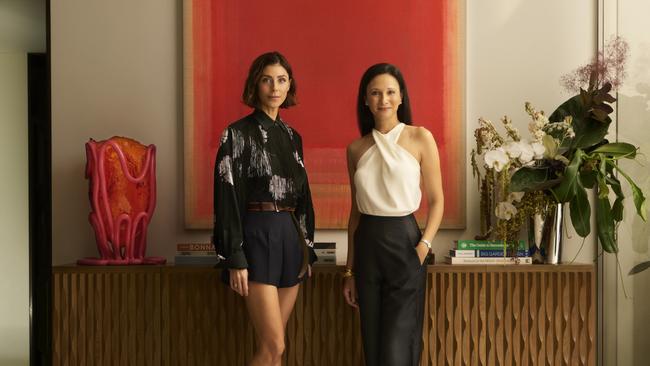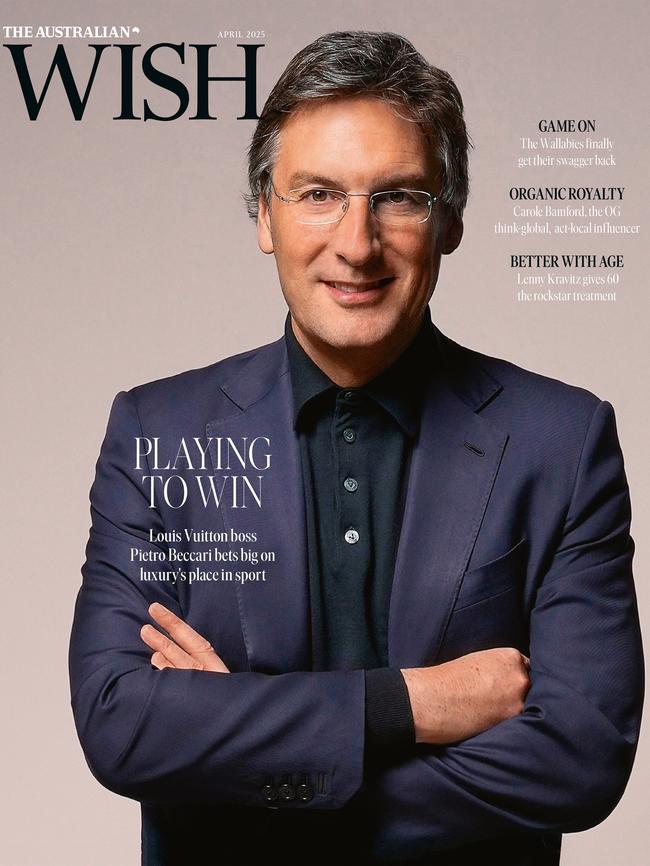Cleola Anderiesz and Rebecca Caratti share their deeply personal experiences with breast cancer
On the eve of the National Breast Cancer Foundation’s 30th anniversary gala, chief executive Cleola Anderiesz and her event co-chair, Vogue Living editor-in-chief Rebecca Caratti, share their personal commitment to driving crucial funding for research that offers hope to end deaths from the disease.

REBECCA CARATTI: Cleola, breast cancer is the focus of your professional work but how has it personally affected your life?
CLEOLA ANDERIESZ: Like many people, I have a story to tell. I lost a very dear friend to breast cancer a few years ago. She was quite young when she was diagnosed, in her early forties. She had treatment, we thought that that was successful, but unfortunately her breast cancer recurred and metastasised to other parts of her body. She left behind two school-aged children and the loss to her family and her friends is something that continues to resonate with us all. It’s part of my motivation to help drive the funding for our research.
For more stories from WISH magazine, find the April issue in The Australian on Friday, April 4
RC: I lost my mother 13 years ago to breast cancer and it’s something I never talk about because I’m very private by nature. When I lost her, it fundamentally changed who I am as a person, which I think is really important to discuss, because it’s not just about the person you lose, it’s also about the effects it has on the people they leave behind. What people may not realise is that this whole period of my life is completely blacked out.
I can’t tell you the year she was diagnosed, but I remember where I was working when I received the phone call. I remember my reaction. So if I put all the pieces together, she would have been in her early fifties. And I remember she had come back from London and my brother was really worried because she couldn’t even walk up stairs and was admitted to hospital.
I was on a work trip at the time and my family wanted to make sure I was back in Sydney, back in my safe space, when I got a phone call.
I was at my desk and my dad told me she’d been diagnosed with breast cancer and they’re the words you never want to hear. You never want to hear “cancer” because your mind automatically goes to death.
She went into treatment, and I would fly between Sydney and my home in Perth every weekend. I’d do the red-eye flight and walk into work at 6am Monday morning. I was a zombie. I was a robot. I was numb. But the treatment seemed to work and she got better. And then – this is where the timeline really is blurry – I think it was a few years later that it metastasised everywhere. That turned into a two-year journey of it taking over her entire body – her brain, bones, liver, lungs – and I watched her deteriorate in front of my eyes.
My mum wouldn’t let me quit my job, but I took off big chunks of time and was her carer at the end. I won’t put a Band-Aid on it; it was truly horrific. I’ve packed it up into a little box of trauma and I’ve kept it inside, but it rears its ugly head at times.
CA: That impact and those memories, we always carry with us, they never go away. How has that motivated you to connect with and support breast cancer research?
RC: I prefer to leave it in its little traumatic box, but I got a call from the National Breast Cancer Foundation (NBCF) in 2021, just after I’d had my second daughter – I have two beautiful girls, aged seven and three. We were in a lockdown and I received a message from someone asking if I would do a post to help raise money, which I was, of course, happy to do. Then about a year later I got a call from yourself to come in for a meeting and I remember automatically telling you my story. I just felt completely comfortable and it was almost like I had needed to share it.
After I left your office, I went to Westfield Bondi Junction and I’ll never forget what happened next – I was in a store and noticed someone who I thought I recognised, but she was wearing a mask. She had big chunks of hair missing and I called her name because I wasn’t sure if it was her. She didn’t respond so I walked over to have a closer look, and it was an old work colleague. And I looked at her and immediately saw in her eyes the look of fear that my mother also had; a look of fear and desperation.
She told me she’d been diagnosed six months prior. I ran into the carpark and called my best friend, crying. And I don’t cry, I bottle everything up. It felt like a sign – the timing was right to work as an ambassador with the NBCF.
I haven’t looked back since, but it has been an emotional ride. Since I’ve started working with the NBCF, I’ve had three friends under the age of 40 with small children diagnosed with breast cancer, or having to go through mastectomies.
We have to talk about it, the realities of it, and how it affects everyone.
CA: Bec, what is it about the research we do that resonates most with you?
RC: The research is the only way of understanding how we can ultimately beat it. I always use the example of how far we’ve come with AIDS. Back in the ’80s, people were dying and it was a horror show, but now people are living fruitful, healthy, amazing lives and that’s all due to research and finding the right treatments to help.
We can’t eradicate cancer, but we can end deaths, prolong lives and improve the quality of life, and that’s what I would love to see. This can only be developed with great research and we need to keep funding it because it’s the only answer.
CA: At the end of the day, research really is the hope. As you say, we may not be able to prevent every case from happening but we may be able to prevent people from dying from the disease; it could become more like a manageable chronic disease rather than something that you may die from. It’s the hope for the future.
RC: Cleola, what led you to becoming chief executive of the NBCF?
CA: I was born overseas in Sri Lanka and came to Australia when I was about four years old. I come from a family of doctors and nurses and I’ve always had a very strong interest in the health of other people. I’m a research scientist by training and I’ve worked in Australia and internationally. My passion has always been about improving the health of individuals and communities, so coming to the NBCF three years ago seemed a natural path for me to help continue to make an impact and improve the lives of Australians who are affected by breast cancer.
The NBCF is Australia’s largest not-for-profit foundation solely focused on funding breast cancer research; our vision is zero deaths from breast cancer. We have a rich and proud history of funding world-class research. If we look back to when the NBCF was established 30 years ago, the death rate from breast cancer in Australia has reduced by more than 40 per cent. So we know it’s possible to move the dial.
RC: Can you share some of the research the NBCF is doing?
CA: Under the NBCF’s Pink Horizon Research Strategy, we are seeking to reinvest up to $125 million during the next five years in four priority areas, which [are] to prevent, detect, stop and treat breast cancer.
The prevention part focuses on something we call precision prevention: understanding how we prevent breast cancer in people who are more likely to develop it.
We know that early detection is important and that the earlier breast cancer is detected, the more successful we are at treating it and the better your outcomes, so there continues to be a really important piece of research around this.
Breast cancer’s not one disease, it’s a series of many subtypes. But when we look at all the subtypes together, we actually know that about one in three breast cancers will recur. There is – and continues to be – a really important piece of research in understanding the progression and recurrence of breast cancer.
There also continues to be important research in understanding how we treat breast cancer, including types such as triple negative breast cancer and metastatic breast cancer. Because ultimately, we know that the nine lives we lose every day from breast cancer in Australia are due to metastatic breast cancer.
RC: Cleola how did you come up with the Pink Horizon Research Strategy?

CA: It was developed in consultation with people who have lived experience of breast cancer, as well as researchers and clinicians and other organisations. It’s a very consultative and informed strategy. We are impatient for change, so we are accelerating our research efforts by funding large scale collaborative research projects that bring together researchers across institutions in Australia, across disciplines, to focus on single intractable problems that we have in breast cancer and help solve them. Each of these research grants will be funded at $25 million over five years.
We’re also going to have a research scheme that we’re calling our Pink Sky Grants – this is funding high-risk, high-reward research with paradigm-changing potential.
So diversifying our research investment and investing in the areas of research that we know are going to help us end deaths from this disease.
RC: How is the NBCF different to other charities in Australia?
CA: The NBCF is the only national charity with a sole focus on funding world-class breast cancer research to end deaths from this disease. It might surprise a lot of people to know we are 100 per cent community funded, so all the research is supported through the generosity of the Australian public and corporate partners.
In the past 30 years, NBCF has invested more than $200 million into more than 600 research projects across Australia, and part of its uniqueness is that funding isn’t tied to a particular institution or state or territory. Donors can have confidence that when they donate to NBCF, the research they’re funding is the best across Australia.
RC: How can people best support the NBCF?
CA: They can make an ongoing or one-off donation; participate in community fundraising activities, such as our Pink Ribbon Breakfasts; take part in workplace giving as part of their organisation; or they can generously leave a gift in their will to NBCF.
Visit nbcf.org.au/donate
This story is from the April issue of WISH.




To join the conversation, please log in. Don't have an account? Register
Join the conversation, you are commenting as Logout